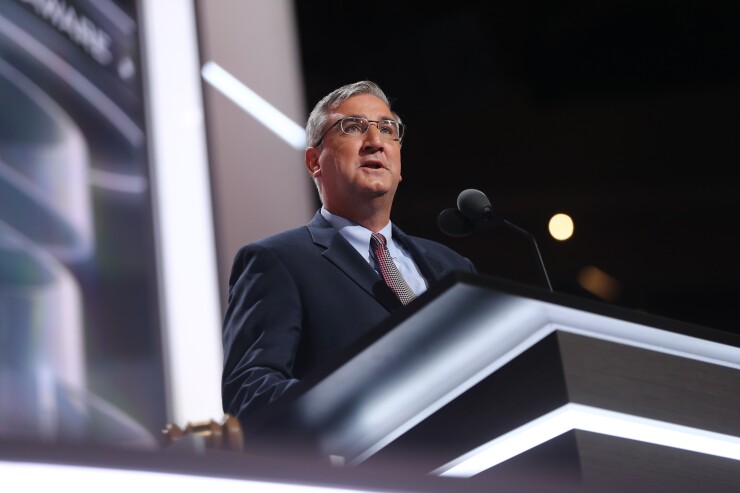Indiana lawmakers signed off on a $34 billion, two-year budget that provides a $150 million payment toward the state’s teacher pension obligations.
The one-time cash infusion will create about $70 million in additional cash flow for schools but does not address the $11 billion of underfunding the system is dealing with, says Sheila A. Weinberg, CEO of the nonprofit government financial watchdog Truth in Accounting.

“Providing additional funding into underfunded pension funds is good, but an additional contribution of $150 million is less than 1.4% of the $11 billion the teachers' pension funds underfunded,” Weinberg said.
The money would go toward the unfunded liability of the Teacher's Retired Fund ‘96 — a defined benefit plan for teachers hired after June 30, 1995. It does not apply to the pay-as-you-go TRF Pre-’96 defined benefit plan for teachers hired before July 1, 1995. Employers do not contribute to the TRF Pre-’96 defined benefit plan — it is funded directly by the state.
According to the Indiana Public Retirement System Comprehensive Annual Financial Report for June 30, 2018, the latest report online, the Indiana State Teachers' Retirement Fund Pre-1996 Account was underfunded by $10.9 billion with a funding ratio of 25.4%.
The Indiana State Teachers' Retirement Fund Post-1996 is underfunded by $111 million with a funding ratio of 98%. Combined, the funds carry an $11 billion tab for a 45.6% funding ratio.
Paying down pension liabilities is generally supportive of a state’s credit profile — lower liabilities are better, said Josh Grundleger, an analyst at Moody’s Investors Service.
“The $150 million provided for in the state budget will modestly reduce school district contributions over the biennium, alleviating some pressure on the districts and freeing up resources for other uses, such as salaries,” Grundleger said.
He said that the one-time money does not make a substantial change in the total pension burden and as growing pension burdens continue to be a problem for school districts it is feasible that additional state support will be needed.
Overall the state will increase education spending by 2.5% with $14.8 billion in funding. Along with the $150 million cash infusion in the pension system, the budget adds $539 million to tuition support over the two years and additional spending on Teacher Appreciation Grants, charters, vouchers and school safety.
The budget plan approved Wednesday night in votes along party lines is now awaiting signature from Gov. Eric Holcomb, who is expected to approve it. Holcomb has praised the investments in K-12 education. Holcomb is a Republican and the GOP holds a legislative majority.
“We balanced our budget for the eighth straight time and protected our AAA credit rating,” Holcomb said in a statement.
The budget also includes $27.5 million each year to pay some beneficiaries, a 13th check in 2020 and 2021, Weinberg said. This was to be the last budget for that benefit, as it's getting replaced in a few years, but lawmakers contemplated eliminating it ahead of schedule.
Education advocacy groups had been seeking a 9% increase in education funding to boost the state's average teacher pay to the midpoint of surrounding states. Lawmakers have said that the savings created from the pension obligation payment could be used to boost salaries.
The budget maintains $2 billion in cash reserves, which Republicans said will allow Indiana to maintain its top-level AAA credit rating.
"When the downturn in our economy happens, and it will, Indiana will be prepared for it," GOP House Speaker Brian Bosma said. "This was very purposeful."
State Rep. Gregory W. Porter, D-Indianapolis, ranking Democrat on the Indiana House Ways and Means Committee, said the one thing that still drives the Republicans is "keeping the state surplus at levels that choke off any serious consideration of funding programs that help Hoosiers.”
“Any budget crafted by Republicans in this era is committed to one goal: preserving a state surplus,” Porter said. “No other consideration ranks as high. This budget lives up to that history.”
Meanwhile, the budget also tackles how $1 billion of toll road money raised from a deal struck with the Indiana Toll Road Company will be spent. For now, the Senate proposes to put that cash into the state's general fund and to use $239 million this year, $218 million in 2020 and $221 million in 2021.
The concession company has 63 years remaining on its 75-year lease of the tollway. Australian fund manager fund IFM Investors
The fund took over the remaining years of the 75-year lease after concessionaire ITR Concession Company LLC, a subsidiary of Macquarie Infrastructure Partners, Macquarie Atlas Roads and Cintra, declared bankruptcy. The original concessionaire took over the toll road in 2006 after paying the state of Indiana $3.8 billion, the largest such privatization at the time.
Lawmakers also approved a gambling bill that legalizes sports betting and opens the doors for new casinos in Gary and Terre Haute.





